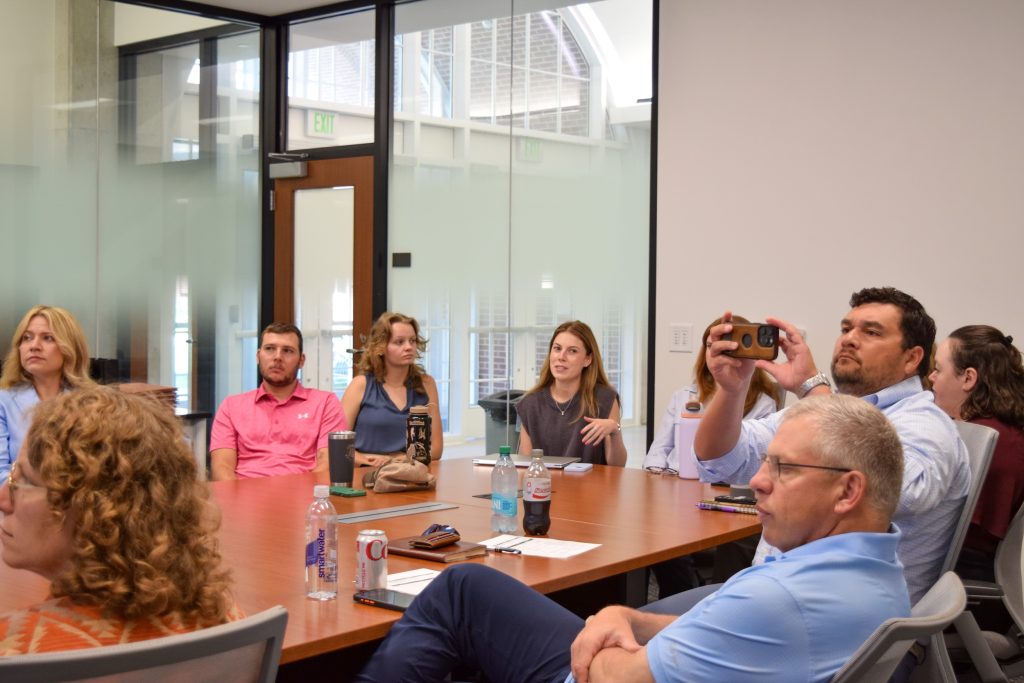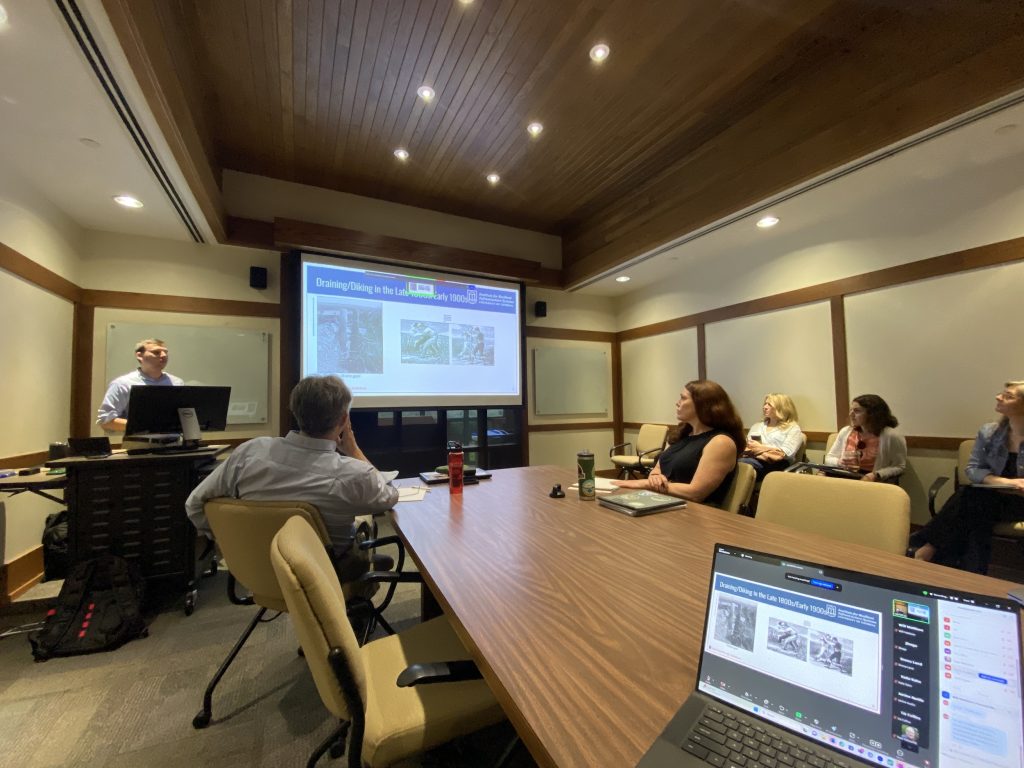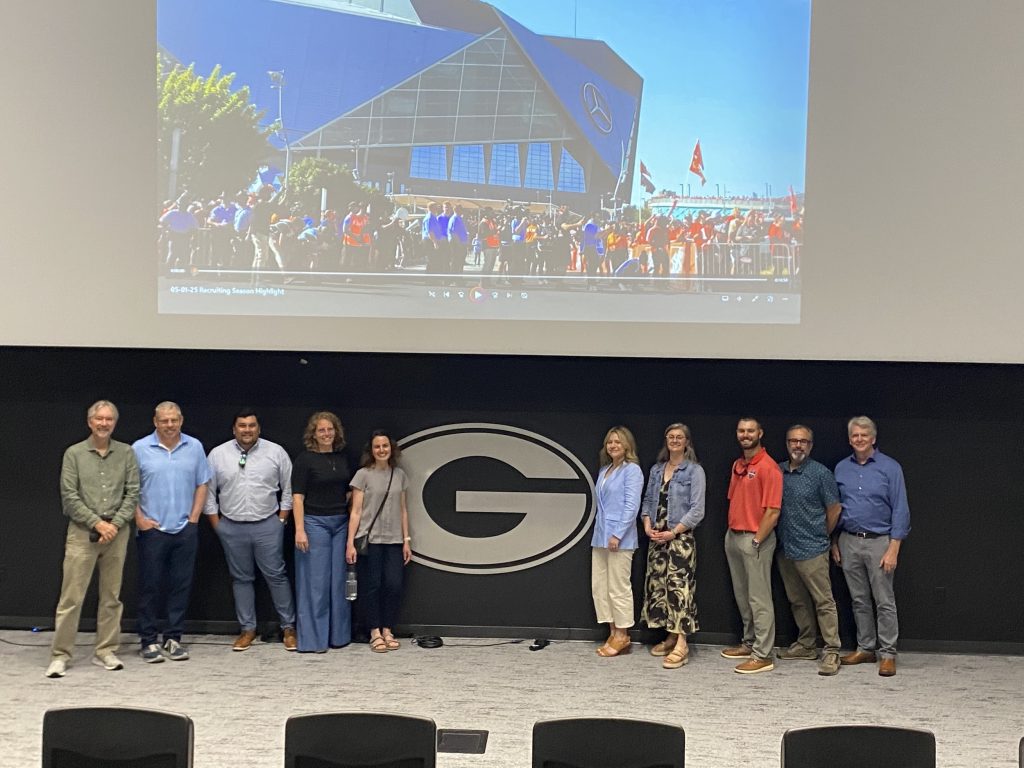ATHENS, GA – In partnership with Ducks Unlimited (DU), the Institute for Resilient Infrastructure Systems (IRIS) offers funded graduate fellowships for Master’s students interested in the science and engineering of Earth’s natural infrastructure to deliver water quality, habitat, flood protection, recreation and benefits using natural systems. These Natural Infrastructure Graduate Fellows, informally known as our Ducks students, gain real-world project experience in planning, design, implementation, and management by working directly with DU staff and partners across the country.
Ducks Unlimited, as an organization, conserves, restores, and manages wetland and associated habitats in the name of protecting North America’s waterfowl. As part of their vision to restore wetlands and habitats across the continent, they have teamed up with Universities, like the University of Georgia (UGA), to help educate the next generation of wetland engineers, scientists, and managers.
“IRIS’s education programs are focused on developing interdisciplinary problem solving and systems thinking competencies in our students,” said IRIS Director Brian Bledsoe. “The Natural Infrastructure Program made possible through our partnership with Ducks Unlimited is the perfect vehicle for building these skills through real-world applications.”
Master’s students in this program conduct both practice-oriented and basic research on natural infrastructure methods and engineering guidance, tool development, benefit-cost and economic analysis, monitoring and adaptive management, and social dimensions of resilient infrastructure with an emphasis on integration of natural and conventional systems. Students also have the opportunity to work on real-world projects with partners across the country.

Last month, the IRIS team welcomed staff from DU and representatives from the Sunshine Charitable Foundation, the sponsor of the Natural Infrastructure Graduate Fellowship, to Athens to meet our Fellows, learn about IRIS and our students and tour the UGA campus.
Between roundtables and presentations with both the Fellows and their advising faculty members, a campus tour, and discussions with former Senior Vice President for Academic Affairs and Provost, S. Jack Hu, DU staff including Dr. Ellen Herbert, and the UGA Foundation representatives were able to take stock of the progress the program has made.
During the program’s first three years, a total of 23 students have been part of the Fellowship, including six alumni, eleven continuing students, and six new students starting this fall. Fellows have been engaged with DU offices and staff in all regions across the country generating innovative research for practitioners.
During the visit, all of the Fellows present had a chance to present and discuss their research with the DU team. The projects that our Fellows work on range across scales, and UGA departments, with students from the College of Engineering, Warnell School of Forestry and Natural Resources, Odum School of Ecology and College of Environment and Design. To wrap up the visit, the DU team and Foundation representatives joined our latest graduate, Nicholas Austin, as he defended his graduate thesis.

“Wetlands are fundamental to preserving healthy waterfowl populations, reducing nutrient pollution of our waterways, and providing recreation for people, and the DU Fellows will serve as a cohort of wetland experts and advocates in the future,” said Natural Resources Professor and Fellow advisor Rhett Jackson. “The Fellows program creates an expansive educational experience in natural infrastructure.”
Meet some of the Ducks!
Alexa Ouellette: Conservation prioritization of coastal freshwater impoundments
Advisor: Nate Nibbelink
Alexa is working towards a Master’s degree in the Warnell School of Forestry and Natural Resources by creating an inventory of coastal impoundments that describes each space’s value as potential waterfowl habitat and its risk for flooding. By learning more about the tradeoffs between good habitat and high risks, Ouellette will provide a more effective system for determining which impoundments are most important for conservation, helping managers make decisions about how to most effectively preserve waterfowl species. This tool will support long term planning across multiple species and decision-making agencies.
Clare DeBerry: Predicting and preventing marsh terrace erosion
Advisor: Felix Santiago-Collazo
Clare is looking at a form of nature-based infrastructure called a marsh terrace; these sandbar-like structures offer perimeter protection along coastal marshes to protect salinity and prevent coastal erosion. DeBerry is currently working towards a Master’s degree in Engineering by creating a hydrodynamic model that simulates the effect of storms on marsh terraces. She’s passionate about hurricane protection, and by learning about how wind and wave energy will impact these structures, she hopes to help preserve shorelines across the Gulf Coast.
Noah Cleveland: Planning for Habitat Change in the Lowcountry
Advisor: Jon Calabria
Noah is a Master of Landscape Architecture student, but instead of designing human spaces, he’s designing wetlands. Cleveland is surveying marsh habitats across the South Carolina lowcountry to predict how these important habitats will change over the next several decades, assisting the Ducks Unlimited South Atlantic Office in their efforts to protect waterfowl habitat. He’s focusing on three species of birds, including both waterfowl and marsh species, modeling suitable habitat over a specified land area and time period to determine high-priority areas for conservation.
Overall, the visit was a successful opportunity to collaborate and learn more about how UGA and DU can continue to develop their partnership.
“We’re excited to welcome a very strong, multi-disciplinary cadre of new fellows and a growing number of faculty mentors from across the university who are working closely with DU to develop projects that will improve the practice and effectiveness of natural infrastructure,” said Bledsoe.
Through this partnership, Ducks Unlimited supports not only the bright future of individual students, but also a new paradigm for the future–where natural infrastructure practices are widely adopted and help support thriving communities and natural systems.
Learn more about the Fellowship here.



